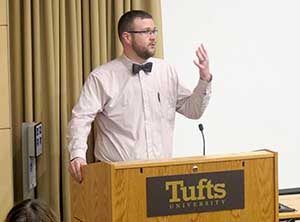
Professor Jared Ross Hardesty spoke on the subject of his new book “Black Lives, Native Lands, White Worlds: A History of Slavery in New England” at Tufts University on December 18.
By Shira Laucharoen
Professor Jared Ross Hardesty of Western Washington University says that his book Black Lives, Native Lands, White Worlds: A History of Slavery in New England is one that the country needs right now. Hardesty discussed his work in a lecture given at Tufts University on December 18.
While the book investigates the institution of slavery in the colonies from its origins in the 17th century through emancipation, its commentary on this facet of the American past speaks to the condition of our world today.
“In New England, there are stereotypes about people of African American descent that come of out slavery, and in the larger transnational dialog about slavery, those [stereotypes] are there,” said Hardesty. “But in New England, in the larger cultural perceptions, there was an act of making slavery history something in the past, that didn’t matter. When we look at the poverty, marginalization, and segregation of African Americans following the end of slavery in New England, those attitudes are applied without taking into account the legacy of slavery, the individual moral failings.”
Hardesty’s book, which provides “a historical reckoning with slavery,” utilizes the unifying theme of connections, highlighting the connection of New England to slavery in other parts of the Americas. Hardesty emphasized the symbiotic relationship between New England and the West Indies, where merchants traded for slaves in exchange for food and livestock. Integral to this system was the cultivation of sugar, which went hand in hand with the expansion of slavery. As plantation economies developed in the Caribbean, the practice of “removing indigenous people from their lands and alienating them, opening lands for settlement” became prominent, said Hardesty.
Slavery, on an ideological level, was often justified through a moral argument, Hardesty writes in his book. New England’s usage of slave labor “helped to normalize, rationalize, and justify the enslavement of fellow human beings,” Hardesty writes. Arguments in favor of slavery had their origins in Christianity, as slaveholders believed it was fair to enslave non-Christians and that the “message of liberation” found in the Bible only applied to some.
Hardesty also makes use of individual stories of enslaved people, which illustrate personal experiences. He describes the life of Jinny, a woman who performed the largely invisible work of a domestic, and also that of Mark, who rebelled against his master by poisoning him. The histories of slaves like Mark give us insight into a particular trend, the arrival of slaves born in the Americas, usually the West Indies.
Hardesty indicates in his book that during the time of the American Revolution, New England underwent a shift in rhetoric and ideas. Criticism of slavery as an institution became more common as a result of Enlightenment thinking and the belief in universal rights of humankind. Yet Hardesty writes that emancipation in New England “did not deliver on its promises of freedom, equality, and civil rights.” Racism still permeated society, as did the attitude that blacks could not be accepted as equals. The specter of slavery had left its impact on society.
The memory of slavery is often engulfed in myths, which we must continue to challenge, said Hardesty. New Englanders often try to represent themselves as occupying “free soil, so rich in liberty that slavery could never take root,” writes Hardesty, separating themselves from other Americans, particularly Southerners. But the legacy of slavery is one that we must not forget, as we continue to question who shapes the narrative, said Hardesty.
“We’re starting to see a change, as the myths are starting to be challenged, and the history is more representative of the truth,” said Hardesty. “So many of those myths were shaped in the post-revolutionary period by leading whites, many of whom were descendants of slave holders. They crafted the narrative that slavery wasn’t important, that is wasn’t important economically, and that only a few people owned slaves. It was tied up in regional exceptionalism, as New Englanders had to define themselves as having a place of freedom. The myths were perpetuated for immediate political reasons but obfuscated our ability to come to terms with slavery in New England.”


















Reader Comments